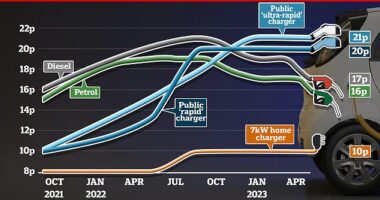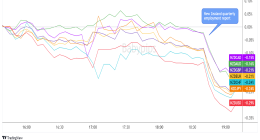SHOPPERS face empty supermarket shelves this winter as farmers warn that staple groceries are in short supply.
Poor pay, rising costs and a lack of a reliable workforce have left Britain’s food supply stretched.
And it has led the secretary of the Lea Valley Growers Association Lee Stiles, to tell The Sun that “we are sleepwalking into a food crisis tunnel without any light at the end.
It comes as several supermarkets have already placed limits on the sale of certain products including eggs.
And now supermarkets face shortages of aubergine, cucumber, peppers and tomatoes as “salad growers face their greatest threat since the 1950s,” according to Mr Stiles.
The crisis in food has even led some to warn that the British cucumber industry may not survive.


Farmers say that it costs roughly 70p to produce a cucumber, but they only make 40p per sale – meaning that cucumber farmers make a loss of 30p per vegetable.
“We are taking all the risks and for a really low price. If the price doesn’t go up, the British cucumber industry will definitely not survive,” said Mr Stiles.
National Farmers Union’s Matin Emmett said: “The viability of producing fruit and vegetables is under the greatest strain I’ve ever seen.
“A continued lack of a reliable workforce, both in permanent and seasonal roles, combined with sharply rising input costs, particularly for energy, has put many businesses on a knife edge.
Most read in Money
“If this pressure continues, it will be simply unsustainable for some businesses to continue as they are.”
The news on fruit and vegetable shortages comes only weeks after
It comes after The Sun exclusively revealed that Britain’s biggest supermarkets were bracing for egg rationing due to supply issues partly because of an outbreak of bird flu.
And the lack of egg supply had already been exacerbated by a number of farmers exiting the industry.
There are fewer laying hens than ever before because rising costs have meant that it is harder for farmers to make a profit.
Asda, Lidl, M&S, Morrisons and Tesco have all put policies in place to limit the number of eggs that customers can buy.
Shoppers visiting Asda, M&S and Morrisons and Tesco can only buy a maximum of two boxes of eggs.
Lidl customers can only buy three cartons of eggs upon each store visit.
Shoppers last faced foodstuffs rationing back in April after supermarkets were forced to limit the sale of sunflower oil.
Shortages were sparked by the war in Ukraine.
Shoppers could only buy two bottles of the oil at Morrisons and Waitrose and Iceland set the limit at one bottle per person.
Brits were last met with rows of empty supermarket shelves due to a lorry driver shortage back in 2021.
The fallout from the Covid-19 pandemic and Brexit meant that supply chains were struggling to meet demand.


Iceland reported shortages of bread and soft drinks while Nando’s had to shut 50 branches because it ran out of chicken.
Wetherspoons faced shortages of some types of beer and bottled water and fresh fruit and vegetables were also missing from shelves at multiple supermarkets.










